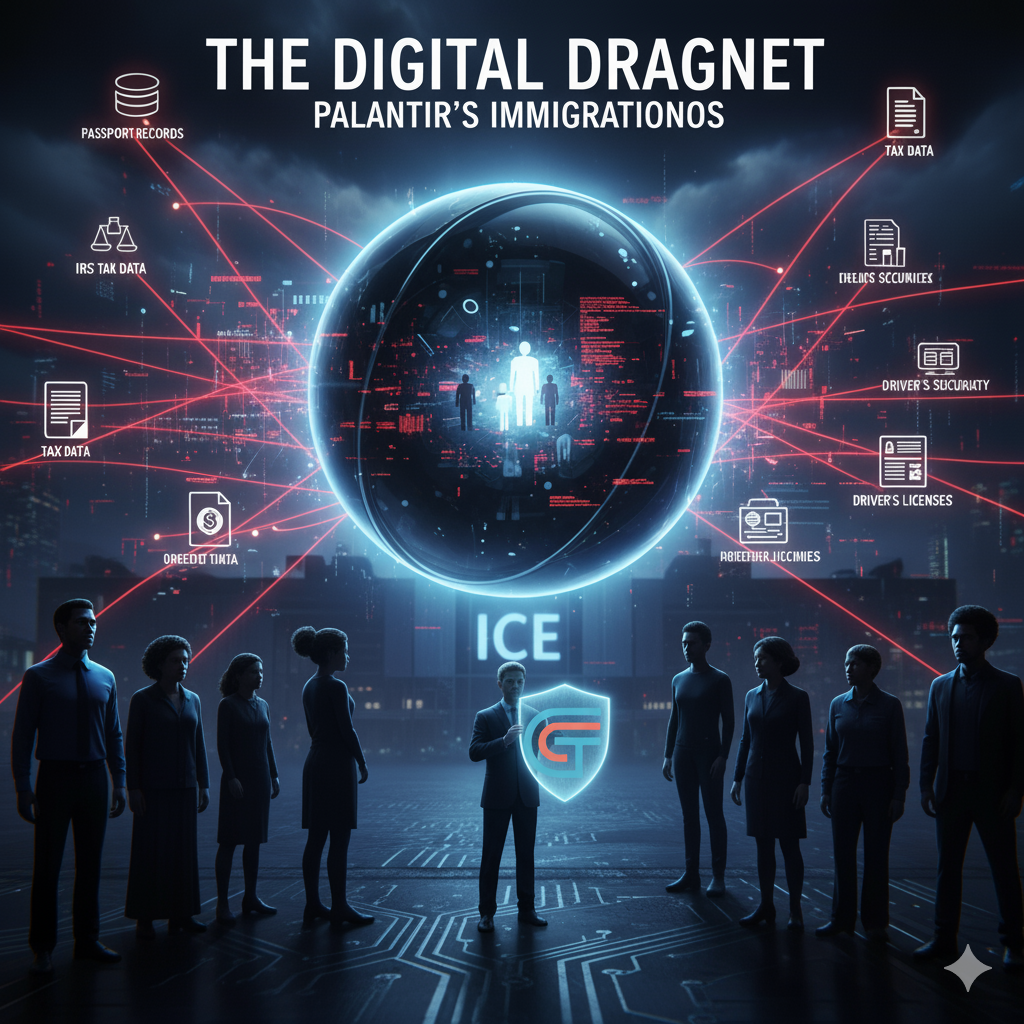👁️ The Digital Dragnet: Palantir’s ImmigrationOS and the New Era of AI Enforcement
Authored by Wendy R. Barlow, Esq.

A powerful, opaque force is fundamentally reshaping U.S. immigration enforcement: the rise of Artificial Intelligence (AI) surveillance systems. At the core of this transformation is Palantir’s ImmigrationOS, a platform secured by ICE in April 2025 under a $30 million contract to “optimize” removal operations and track individuals for enforcement.
Named after the “all-seeing stones” of fantasy lore , ImmigrationOS is poised to observe and influence real-world events by integrating vast federal government databases. This technological expansion demands that all immigration practitioners immediately adapt their strategies to protect their clients.
What is ImmigrationOS and How Does the AI Network Function?
ImmigrationOS is an evolution of Palantir’s existing Investigative Case Management (ICM) system, which ICE has used since 2013. The new platform streamlines enforcement through three core components:
- Targeting and Prioritization: The system helps ICE streamline decisions on who should be removed first, prioritizing targets like “violent criminals” and “visa overstays”.
- Self-Deportation Tracking: It monitors whether individuals are voluntarily leaving the United States.
- Immigration Lifecycle Management: It streamlines the deportation process from initial identification through to removal logistics.
The Cascading Consequences of Data Integration
The system’s true threat lies in its ability to act as a searchable “super-network”. It pulls information from across government sources—including passport records, IRS tax data, Social Security files, and driver’s license data—to create comprehensive profiles.
This data aggregation happens regardless of the veracity or accuracy of the source information. A mistake or misattribution embedded in one file can now have cascading, life-altering consequences across the entire federal enforcement structure.
❗ Example of Cascading Enforcement: A social media post criticizing the current administration can lead to visa revocation by the State Department (DOS). This revocation immediately triggers a DHS notification, enabling detention and removal proceedings flagged by ImmigrationOS.
The “Black Box” Challenge for Legal Defense
As practitioners, our expertise is built on understanding the criteria federal officers and judges use to make decisions. However, ImmigrationOS and the broader AI surveillance infrastructure operate largely in a black box.
We may never know:
-
What specific data points trigger alerts, or how different factors are weighted?
-
How to effectively challenge algorithmic determinations that lead to detention or loss of status?
-
Whether a “human in the loop” is required to ensure due process for flagged individuals?
Even with low error rates, the stakes for affected individuals—loss of status, detention, or wrongful deportation—are often catastrophic.
Practical Steps
The integration of AI into enforcement represents a permanent shift. At Cohen, Tucker + Ades, we believe our duty is to help clients understand this new reality and mitigate the risks.
- Expanded Client Counseling: We provide increased counseling to all clients to help them understand these sweeping oversight efforts. This includes advising on curating a mindful social media presence and understanding that seemingly minor issues, like traffic violations, can now trigger consequences across integrated government systems.
- Proactive Information Gathering: We have expanded our own information-gathering from clients to be prepared for decisions based on this newly available, aggregated data. This requires aligning FOIA requests to these new technological realities.
Like the powerful, deceptive orbs of fantasy, ImmigrationOS operates with an opacity that is poised to significantly reshape the lives of those it targets. Our job is to advocate relentlessly, document its impacts, and shine a light into the black box of algorithmic enforcement.
Disclaimer: This blog post contains general information and is for informational purposes only. It is not legal advice and does not create an attorney-client relationship between you and Cohen, Tucker + Ades P.C. Immigration laws and fee schedules are subject to frequent change. The information provided herein may not reflect the most current legal developments. You should not act or refrain from acting based on information contained in this post without seeking professional counsel from an attorney licensed in your jurisdiction. Cohen, Tucker + Ades P.C. expressly disclaims all liability in respect to actions taken or not taken based on any or all of the contents of this post.
Sources:
AILA | Palantir’s ImmigrationOS—WhatPractitioners Need to Know
Not sure which option is right for you? Request a confidential consultation today.

